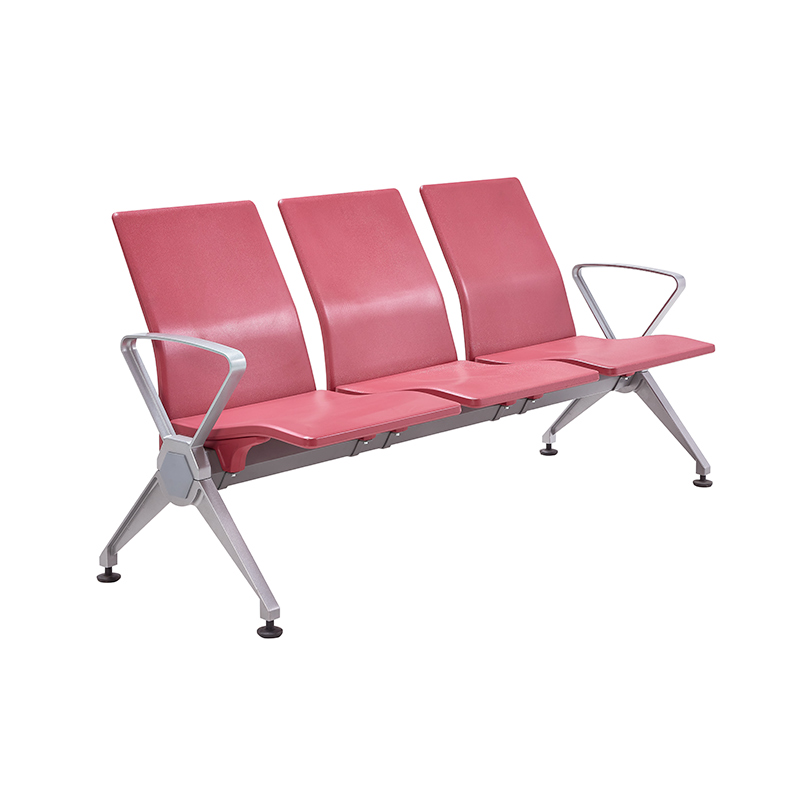What Are The Different Types Of Airport Seating
Airport seating is a critical element in terminal design, directly shaping passenger comfort, circulation, and operational efficiency. As airports expand and evolve, the demand for diverse seating solutions grows—ranging from high-density waiting rows to premium lounges and rest zones. Understanding the main types of airport seating helps planners and buyers select the right balance of comfort, durability, and style for every zone. Our airport seating collection provides flexible configurations that adapt to different environments, combining ergonomic support with modern aesthetics.
1. Beam Seating: The Backbone of Public Terminals
Structure and Purpose
Beam seating—also known as tandem seating—is the most common configuration in airports. Each unit combines multiple seat shells fixed to a central beam supported by metal legs. This system maximizes space while maintaining order and accessibility in busy halls.
Key Features
High Durability: Frames are typically made from stainless steel or aluminum alloy, ensuring stability under continuous public use.
Easy Maintenance: Modular design allows damaged seats or arms to be replaced without dismantling the entire row.
Custom Options: Seat pans can be made of perforated steel, molded polypropylene, or upholstered foam, available in various colors and finishes.
Flexibility: Rows can include armrests, intermediate tables, or armless sections for accessibility.
Applications
Beam seating is ideal for departure gates, immigration areas, and public lounges, where seating capacity and easy maintenance are priorities. Our airport beam seating models are engineered with anti-rust coating and ergonomic contours to keep passengers comfortable during long waits.
2. Lounge and Recliner Seating: Comfort for Extended Waits
Design Concept
While beam seating focuses on density, lounge-style and recliner seating emphasize comfort and relaxation. These models often feature wide, contoured shells with gentle curves that support natural body posture, suitable for passengers spending several hours between flights.
Key Features
Ergonomic Contour: Lounge chairs provide back and leg support with extended reclining surfaces.
Premium Materials: Molded plastic, aluminum, or cushioned upholstery enhance visual appeal and comfort.
Modular Arrangement: Single or paired recliners can be combined with center tables or integrated charging outlets.
Functional Versatility: Some designs incorporate cup holders, luggage space, and even power connections.
Applications
Recliner seating is often placed in quiet zones, business lounges, or overnight waiting areas where passengers can rest comfortably. The combination of function and aesthetic appeal makes these chairs an ideal choice for modern, passenger-centric terminals.
3. Metal Bench and Plastic Shell Seating: Practicality Meets Durability
Metal Bench Systems
Perforated metal benches are known for their strength and fast maintenance. Made from galvanized or powder-coated steel, they resist corrosion and are ideal for high-traffic areas. The perforation design allows airflow, keeping seats cool and easy to clean, even in outdoor or semi-open spaces.
Advantages:
Long lifespan and high load capacity.
Excellent fire resistance and weather protection.
Quick-clean surfaces ideal for public sanitation requirements.
Best Locations: Bus gates, immigration halls, or outdoor waiting zones where durability and hygiene are critical.
Plastic Shell Seating
Molded polypropylene shells offer lightweight flexibility with bright, customizable colors. The curved backrest design provides ergonomic support while giving terminals a modern, vibrant appearance.
Advantages:
Scratch-resistant, UV-protected surfaces.
Smooth, wipe-clean finish ideal for airport cleaning routines.
Available in various tones for easy area zoning or branding.
Best Locations: Check-in halls, landside waiting areas, or children’s play corners where color and design enhance the overall environment.
4. Upholstered and Power-Integrated Airport Seating: Modern Comfort with Function
Upholstered Seating
As airports shift toward hospitality-inspired design, upholstered airport seating bridges the gap between efficiency and comfort. Seats use high-density foam covered in vinyl, PU leather, or treated fabric that withstands cleaning chemicals and continuous use.
Key Benefits:
Soft-touch seating enhances user comfort during long waits.
Noise absorption creates a calmer atmosphere in busy halls.
Color-matched upholstery complements architectural interiors.
Power-Integrated Benches
In the digital age, passengers expect access to charging ports at every stage of travel. Power-integrated seating combines electrical outlets, USB ports, and wireless charging pads directly within the seating unit or center tables.
Functional Advantages:
Encourages longer dwell times at gates and retail areas.
Reduces clutter by eliminating the need for separate charging stations.
Built-in cable management ensures safety and clean design lines.
Applications: Power-integrated seating suits boarding lounges, business-class areas, and airline-branded gates, enhancing convenience and overall passenger satisfaction.
Conclusion
Airport seating design goes beyond aesthetics—it is a functional system that balances capacity, comfort, and longevity. The four primary categories—beam seating, lounge seating, metal and plastic shell systems, and upholstered power-integrated solutions—each serve a distinct operational purpose within the terminal.
Choosing the right mix ensures efficient passenger flow, easy maintenance, and a pleasant travel experience. Our airport seating series delivers modular design, ergonomic shaping, and durable materials that meet international safety standards—helping airports create efficient, welcoming spaces that reflect the future of modern travel.




